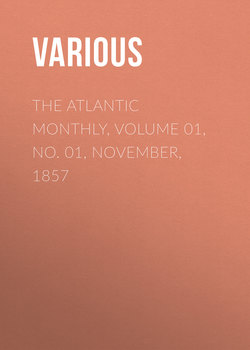The Atlantic Monthly, Volume 01, No. 01, November, 1857

Реклама. ООО «ЛитРес», ИНН: 7719571260.
Оглавление
Various. The Atlantic Monthly, Volume 01, No. 01, November, 1857
DOUGLAS JERROLD
FLORENTINE MOSAICS
I. HISTORICAL
II. SAN MINIATO
III. ACADEMY OF THE FINE ARTS
IV. SANTA MARIA NOVELLA
V. SAN SPIRITO
SANTA FILOMENA
SALLY PARSONS'S DUTY
THE MANCHESTER EXHIBITION
THE ROMMANY GIRL
THE CHARTIST'S COMPLAINT
DAYS
BRAHMA
THE AUTOCRAT OF THE BREAKFAST-TABLE
ILLUSIONS
THE GIFT OF TRITEMIUS
THE MOURNING VEIL
PENDLAM: A MODERN REFORMER
BRITISH INDIA
AKIN BY MARRIAGE
CHAPTER I
CHAPTER II
THE ORIGIN OF DIDACTIC POETRY
THE FINANCIAL FLURRY
SONNET
THE ROUND TABLE
LITERARY NOTICES
MUSIC
Отрывок из книги
The capital of Tuscany—according to its most respectable and veracious chroniclers—is the oldest city extant. Its history is traced with great accuracy up to the Deluge, which is as much as could be reasonably expected. The egg of Florence is Fiesole. This city, according to the conscientious and exhaustive Villani, [Footnote: Cronica. Lib. I. c. vii.] was built by a grandson of Noah, Attalus by name, who came into Italy in order "to avoid the confusion occasioned by the building of the Tower of Babel." [Footnote: "per evitare la confusione creata per la edificazione della torre di Babel," etc.] Noah and his wife had, however, already made a visit to Tuscany, soon after the Deluge; so that it is not remarkable that "King Attalus" should have felt inclined to visit the estates of his ancestor. At the same time, it is obvious that the Noahs had not been satisfied with the locality, and had reëmigrated; for Attalus, upon his arrival, found Italy entirely without inhabitants. He, therefore, with great propriety claimed jurisdiction over the whole country, elected himself king, and his wife Electra queen; built himself a palace, with a city attached to it; and in short, made himself, generally, at home. We are also fortunate in having some genealogical particulars as to his wife's antecedents; and it is to be regretted that modern historians, of the skeptical, the irreverent, and the startling schools, could not imitate the gravity, the good faith, and the respect for things established, by which the elder chroniclers were inspired. The apothecaries of the Middle Ages never dealt so unkindly with the Pharaohs of Egypt, as the historical excavators of more recent times have done with the embalmed, crowned, and consecrated mummies which they have been pleased to denounce as delusions. Your Potiphars or your Mizraims, even when converted into balsam, or employed as a styptic, were at least not denuded of their historical identity by the druggists who reduced their time-honored remains to a powder. Their dust was made merchandise, but their characters were respected. Moreover, there was an object and a motive, even if mistaken ones, on the part of the mediæval charlatans. But what ointment, what soothing syrup, what panacea has been the result of all this pulverizing of Semiramis and Sardanapalus, Mucius Scævola and Junius Brutus? Are all the characters graven so deeply by the stylus of Clio upon so many monumental tablets, and almost as indelibly and quite as painfully upon school-boy memory, to be sponged out at a blow, like chalk from a blackboard? We, at least, cling fondly to our Tarquins; we shudder when the abyss of historic incredulity swallows up the familiar form of Mettus Curtius; we refuse to be weaned from the she-wolf of Romulus. Your unbelieving Guy Faux, who approaches the stately superstructures of history, not to gaze upon them with the eye of faith and veneration, but only that he may descend to the vaults, with his lantern and his keg of critical gunpowder, in order to blow the whole fabric sky-high,—such an ill-conditioned trouble-tomb should be burned in effigy once a year.
Electra, then, wife of Attalus, founder and king of Fiesole, was of very brilliant origin, being no less than one of the Pleiades, and the only one of the sisters who seems to have married into a patriarchal family. "The reason why the seven stars are seven is a pretty reason"; but it is not "because they are not eight," as Lear suggests, but, as we now discover by patient investigation, because one of them had married and settled in Tuscany. We are not informed whether the lost Pleiad, thus found on the Arno, was happy or not, after her removal from that more elevated sphere which she had just begun to move in. But if respectability of connection and a pleasant locality be likely to insure contentment to a fallen star, we have reason to believe that she found herself more comfortable than Lucifer was after his emigration.
.....
"Sally," said he, "is that feller sparkin' you?"
Sally laughed a little, and something, perhaps the blaze, reddened her face.
.....